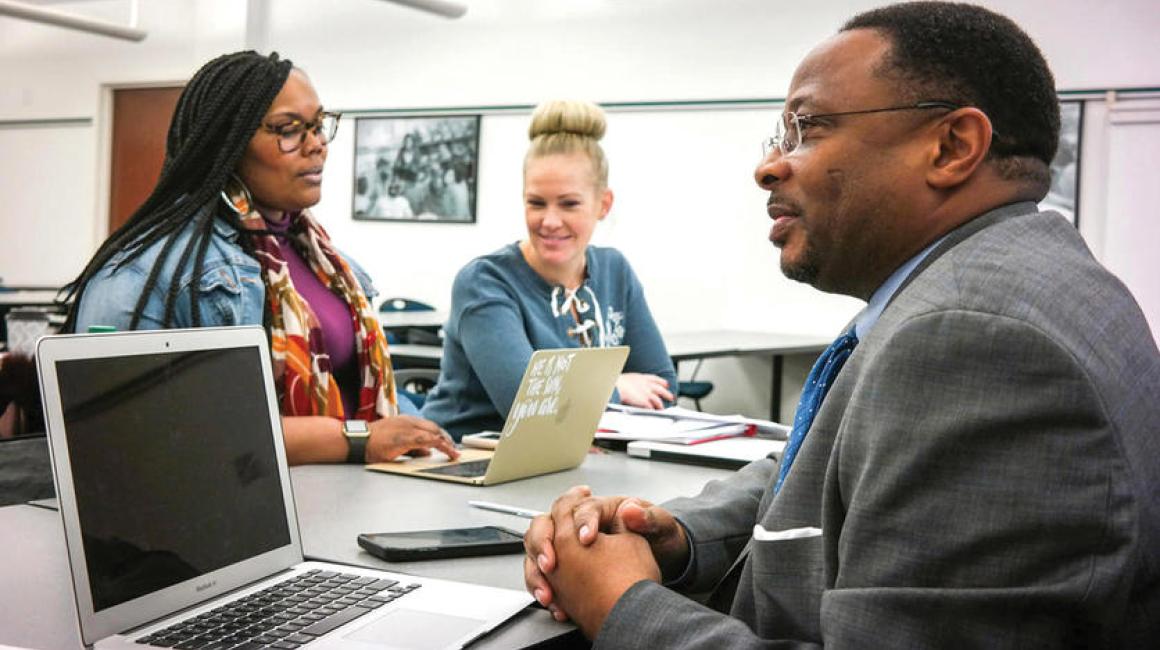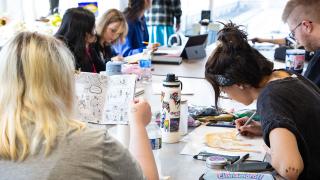
But as more programs come online, there’s also increasing awareness among educators and researchers that STEAM opportunities aren’t evenly distributed. In particular, women and people of color continue to be underrepresented in many STEAM educational spaces — and subsequently in corresponding job settings.
This semester, Lecturer Truman Hudson Jr.’s EDA 515 class set their sights on another acute STEAM opportunity gap: the one faced by black LGBTQ+ students.
“Over the past 12 years, I’ve been working with the LGBTQ+ community to develop programming that helps increase access to educational, employment, social and emotional supports and services,” said Hudson, who holds a Doctor of Education degree in metropolitan education. “Consistently, what we’ve found is that beyond gaps in services and supports, LGBTQ+ voices are even more marginalized and underrepresented when it comes to the STEAM fields. A cursory review of the leadership ranks in those areas further highlights the absence of LGBTQ+ voices in STEAM professions.”
With support from a Ford Community Corps award and Ford GLOBE — Ford Motor Co.’s LGBT employee resource group — Hudson’s roster of master’s and doctoral students set to work designing a STEAM curriculum specifically focused on LGBTQ+ high school students. The team launched their “Blank Canvas” project by first reaching out to students, teachers and community partners (most notably LGBT Detroit), in order to gather some on-the-ground perspectives about the needs and opportunities for LGBTQ+ students. Then, based on those ideas, they built programming designed to be used in either a classroom or student club setting.
"What we heard from our partners — and what we know as educators — is that without students embracing their own agency and feeling like their voice is valuable, learning can often hit an impasse."
But what Hudson’s students came up with isn’t necessarily your typical approach to STEAM education. In this space, the learning opportunities are often anchored by hands-on design or engineering projects. But a good part of the Blank Canvas programming is quite philosophical — taking cues from International Baccalaureate curriculum, which emphasizes interdisciplinary approaches, critical thinking and culturally responsive materials.
A case in point is the first of two units, which focuses on a reading and discussion of Alice Walker’s short story Everyday Use. The topic, on its face, is far from the STEAM realm: The characters in the story are wrestling with the complexity and diversity of African American identities. But given Blank Canvas’ target audience, UM-Dearborn master’s student and high school language arts teacher Chandrika Williams says the text makes a perfect leaping off point for discussing the identity challenges black LGBTQ+ students often face.
“What we heard from our partners — and what we know as educators — is that without students embracing their own agency and feeling like their voice is valuable, learning can often hit an impasse,” Williams said. “So while the historical context of the story might be a little different from their own, the themes set a tone and space for conversation. This is a great way for students to explore how they can find their voice and develop their identity.”
Having worked through that humanities unit, the students then move on to a second science-driven challenge. Here the students explore inequities around nutrition and food access in Detroit, exploring both the science and politics that shape those issues. As part of that work, students conduct surveys of friends, families and neighbors to map challenges faced by their own communities. They’ll then use that data to design a project that promotes food justice.
If building a curriculum like this sounds like an ambitious project to complete in just one semester, it is. In fact, doctoral student and middle school science teacher Ashley Mastroianni said creating such a complex, nuanced and flexible program from scratch has been one of the biggest challenges of her academic career.
“This is not a project where there is a right or wrong answer,” Mastroianni said. “You simply have a challenge, and then you have to use your creativity and experience to create something meaningful. You also have to do it with a bunch of people you’ve never met, and for students who have experiences that are really different from your own. The conversations are very deep and eye opening. But if you’re willing to let yourself be pushed, your growth as an educator can be pretty incredible.”
Mastroianni and the rest of the team will get to see the curriculum in action in 2019 when LGBT Detroit uses it as part of its summer programming. From there, Hudson said they’ll assess that pilot and make some improvements, before deploying the Blank Canvas project with schools and nonprofits throughout metro Detroit.


